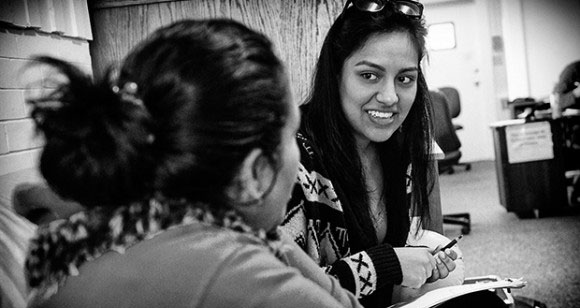It’s a small, nondescript brick house on Simpson Street in downtown Greensboro. No signs or shingles hang out front.
But this house serves an essential purpose. Local immigrants, mostly Hispanic, who would otherwise go without, get low-cost health care here.
FaithAction International House, a Greensboro agency that helps immigrant families transition into the local community, operates the health center for its clients. Two local physicians volunteer here. And some of UNCG’s nursing and social work students do clinicals here.
Jayne Lutz, who coordinates the capstone clinical course for the RN to BSN program in the School of Nursing, says the students learn more here than textbooks can teach them. These students are already registered nurses and are taking courses to complete the bachelor’s degree.
“They say to me, ‘This reminds me of why I want to be a nurse,’ ” Lutz says. “They went into this profession to help people, certainly not to make money.”
Lutz has set up several clinical opportunities for students to work with underserved populations, and the FaithAction center is one more example. Because they most often work at hospitals, the students are somewhat sheltered from the harsh realities that face the uninsured or underinsured, she says.
“They need to know the barriers some of these people are up against. This is life-changing for them.”
When Greensboro’s Healthserve clinic closed, many immigrants were left without a viable option for care. People with common conditions like hypertension or diabetes would go to the emergency room to get a few weeks of medications.
“That’s the most expensive, least effective way to get care,” Lutz says.
But, as Lutz found out last summer, two local doctors, Beth Mulberry and Annmarie Mazzocchi Anemone, had anticipated the crisis prompted by Healthserve’s closing and had already begun networking to set up new options for those who would lose their health care.
“We knew they would no longer have a health care home other than the emergency room,” Mulberry says. The FaithAction health center opened in October and serves on average 12 to 15 clients a week. The center is open Thursdays from 9 a.m.- 5 p.m.
Holy Trinity Episcopal Church donated use of the house. Mulberry and Mazzocchi Anemone volunteer medical services each week. Medical visits are $10. Mental health services are free.
New immigrants and refugees make up about 10 percent of Guilford County’s population, says Rev. David Fracarro, director of FaithAction. The majority of the people FaithAction serves live in Guilford County, though the agency is seeing an increase of immigrants from nearby rural counties for all of its services, which range from health and legal services to language and computer classes to photo IDs.
“Many of the clients we serve live in mixed status families, meaning the parents may be undocumented, and the children may be U.S. citizens,” Fraccaro says. “For those who are undocumented, as well as those with other legal but limited statuses, there really is no avenue for healthcare.”
The center is amazingly cost-effective, Fraccaro adds, operating on a shoestring budget and staffed mostly by volunteers like Lutz and the nursing students.
Lutz says some nursing students and faculty even worked at the center over UNCG’s winter break. “That’s a real testimonial to the value they see in this experience.”
Sandra Barrera, an undergraduate social work student, helps provide mental health services at the center. While a large cohort of about 30 nursing students rotate through each week, Sandra and another student pursuing his master’s in social work are assigned to the center.
The internships are offered through the Congregational Social Work Education Initiative (CSWEI). CSWEI is supported by the Cone Health Foundation.
“You become culturally competent,” says Sandra, who is bilingual. “For me, it’s a chance to be involved with an underserved population who lack healthcare. A lot of clients don’t speak English. I can interact with them in their own language.”
Mulberry is involved with plans for a larger health center for underserved populations, Mustard Seed Community Healthcare, in East Greensboro. She would eventually like to see a more holistic approach to health at the new site, with an urban garden, dental care, a pharmacy, programs on healthy eating and exercise, open spaces for kids to play, even early childhood education.
The Mustard Seed center, supported by the Texas-based ECHO (Empowering Community Healthcare Outreach), involves health care providers, universities like UNCG and NC A&T, service agencies like FaithAction, the Cottage Grove Initiative and community leaders like Odell Cleveland, a local pastor and founder of the Welfare Reform Liaison Project.
“It’s a way for all of us to work together rather than in silos,” Mulberry says.
Story by Michelle Hines, University Relations
Photography by David Wilson, University Relations
reposted from UNCG News & Features
